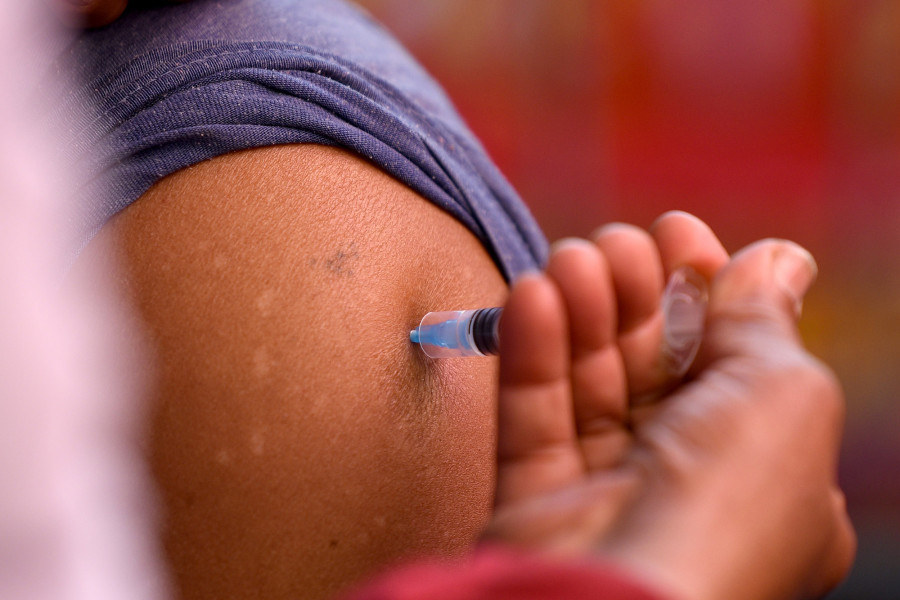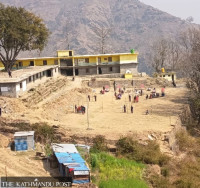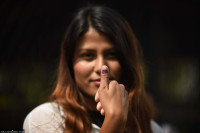National
As US supplies vaccines to some countries, Nepal waits and wonders
Nepal fails to become Washington’s priority for vaccine aid despite its urgent needs. There is no clarity on doses and delivery of the jabs White House announced last month.
Anil Giri
On June 3, US Ambassador to Nepal Randy Berry celebrated the Joe Biden administration’s announcement that Nepal would be among the countries to receive vaccines against Covid-19.
“I join my fellow Americans & all friends of Nepal, in celebrating the @Whitehouse announcement that Nepal will be among the countries to receive direct vaccine donations from the United States,” Berry wrote on Twitter. “More details are coming soon,” he added, referring to the fact sheet announced by the White House for the first time.
The White House had announced that approximately seven million vaccines would be distributed in India, Nepal, Bangladesh, Pakistan, Sri Lanka, Afghanistan, Maldives, Malaysia, Philippines, Vietnam, Indonesia, Thailand, Laos, Papua New Guinea, Taiwan, and the Pacific Islands through COVAX.
There was no clarity on the number of doses Nepal was supposed to receive. It’s exactly a month since the announcement but Nepal has not received a single dose of vaccine yet.
After Nepal crumpled under the Covid-19 onslaught when the second wave of coronavirus hit the country, the government made a clarion call to the international community for support, seeking medical supplies and vaccines. Various countries, including the United States, have come forward to show their generosity by providing medical goods. But Nepal has not received a single dose of vaccine from any country besides India and China.
On June 21, the Biden administration made yet another announcement of sharing 55 million doses—of the total 80 million doses announced in April—among various countries. Nepal was on the list of recipients of the doses under COVAX, an international vaccine sharing scheme backed by the United Nations.
“Approximately 16 million for Asia to the following countries: India, Nepal, Bangladesh, Pakistan, Sri Lanka, Afghanistan, Maldives, Bhutan, the Philippines, Vietnam, Indonesia, Thailand, Malaysia, Laos, Papua New Guinea, Taiwan, Cambodia, and the Pacific Islands,” read the White House fact sheet.
Though the US ambassador claimed that Nepal would receive “direct” vaccine support from the Biden administration, Nepali officials in Kathmandu and Washington, DC, say they have no clue about it.
According to multiple officials the Post spoke to, as of now Nepali authorities have no idea how many doses Nepal will receive directly from the United States or under COVAX. They said they were completely unaware of the number of doses and the shipping and delivery dates.
A Foreign Ministry official in Kathmandu said that as matters stand at present, the US will provide vaccines to Nepal only through COVAX.
According to a briefing by the Embassy of Nepal in Washington, DC, last week, the total US vaccine support doses available for the group of 17 Asian and the Pacific Island countries, including Nepal, has now reached 23 million.
“However, as of today, it has not been clear how much each country, including Nepal, will get out of the total 23 million doses,” reads the embassy briefing. “The embassy is putting forward its case with the US side for more vaccine doses to Nepal on the basis of prevalent higher case incidence and its income status.”
Amid this, reports of Washington “directly” supplying vaccines to other South Asian countries like Bangladesh and Pakistan, however, come as a surprise for vaccine-starved Nepal.
Earlier this week, the White House said it would begin shipments of 2.5 million doses of Moderna vaccine each to Bangladesh and Pakistan.
On Tuesday, the White House said it began the shipment of 2.5 million doses of Moderna vaccine to Bangladesh. The Biden administration also said that the US would also ship two million doses of Pfizer vaccine to Peru and 1.5m doses of Moderna vaccine to Honduras.
Nepal, however, has failed to become a priority for the US when it comes to vaccine supplies, even as the country faces a grave threat of the third wave of the coronavirus. So far, a little less than 9 percent of the total population in Nepal has been vaccinated. Only about 2.5 percent of the population has received both doses.
Nepal’s requests to American firms Johnson & Johnson and Moderna for commercial deals have also been denied, with both saying they won’t be able to supply vaccines before 2022. With India still reluctant to resume vaccine export, Nepal’s vaccine import prospects have massively diminished.
Against this backdrop, Nepal has been desperately looking to the United States for vaccines.
Nepal so far has received direct vaccine donations from India (1 million doses) and China (1.8 million doses). Nepal had signed a deal to procure 2 million doses from India’s Serum Institute, but after supplying 1 million doses, the institute expressed its inability to provide the next consignment.
“Our rough estimate is that we might receive around one million doses or so from the United States,” said a Nepali diplomat in Kathmandu who spoke on condition of anonymity. “Under the COVAX facility too, it is the US or the donor country that dictates the numbers and priority.”
For direct vaccine donations, according to the White House’s fact sheet, the United States has received requests from countries all over the world.
“The US will share up to one-quarter of its donated doses directly with countries in need, those experiencing surges, immediate neighbours, and other countries that have requested immediate assistance,” reads the fact sheet.
With just commitments but no actions on vaccines from the United States, concerns in Nepal have grown if the KP Sharma Oli administration’s failure to engage Washington is the cause.
Some diplomats and experts say the Oli administration indeed failed to lobby and make a strong case for Nepal to ensure that it is eligible to receive vaccines from the United States under an immediate priority.
Shanker Sharma, a former ambassador to Washington, DC, says a strong lobby is what is required in the United States to get things done.
“Probably we could not lobby much in Washington for vaccines. There are some Americans who are friends of Nepal. There are also some influential Democrat senators like Dianne Feinstein among others in Washington,” Sharma told the Post. “We have to find leaders or celebrities or any strong lobbyist who can influence the White House or the State Department to get things done.”
If what officials claim and ministry statements, including by the Ministry of Foreign Affairs, are anything to go by, Nepal has been consistently requesting vaccines from the United States.
Then foreign minister Pradeep Gyawali on May 24 had made a telephone call to the US Deputy Secretary of State, Wendy Sherman.
According to the Ministry of Foreign Affairs, commending the US leadership on garnering collaborative response against the global pandemic, Gyawali had requested Sherman to accord due priority to Nepal during the distribution of surplus vaccines among the developing nations.
President Bidya Devi Bhandari on May 27 wrote to US President Biden seeking immediate vaccine support to Nepal. Nepal’s Ambassador in Washington Yubraj Khatiwada had handed over the President’s letter to Ervin Massinga, a senior advisor at the US Department of State, on May 28.
Many wonder if Nepal’s failure to move the Millennium Challenge Corporation (MCC) forward has become an irritant for Washington. The MCC was signed back in 2017, but its parliamentary ratification has been delayed due to divisions among political parties over the programme under which Nepal is supposed to receive $500 million under grants.
Sharma, the former ambassador to Washington, however, does not see the MCC as a cause for the US reluctance to extend vaccine support.
“There may have been some hiccups but I do not see much problem in Nepal-US ties,” Sharma told the Post. “The government appears to be supportive of the MCC and it has also committed to its ratification and execution. So Nepal should have been listed as a priority country for vaccines.”
Questions, however, remain why Nepal is failing to become a priority country for the White House even as it is sending vaccines to other countries under direct donations, besides the Biden administration’s commitment to provide the jabs through COVAX.
As soon as countries managed to develop the vaccine against Covid-19, it immediately became one of the world’s most in-demand commodities and a tool for international diplomacy. Observers say Nepal failed to realise both facts—the Oli administration neither made a move to order the jabs nor used diplomacy to acquire them.
A former Nepali ambassador to the United States told the Post that there are some reasons behind the current mess. He, however, refused to elaborate on them.
“But it’s a simple fact that when a commodity is scarce and it is in high demand, one needs to use strong diplomacy to get it or place orders in advance with payments,” said the former ambassador who did not wish to be named.
According to him, one major mistake the Oli administration made was it tried to get vaccines under donations and grants.
“If other countries can secure vaccines from the US, why not us?” he wondered. “We have former ministers in New Delhi, Beijing and Washington, DC, serving as ambassadors. But they have miserably failed to secure the vaccine when we need it the most.”
Nepal needs to vaccinate 72 percent of its 30 million population, or around 22 million people, for which it needs around 44 million doses. As COVAX had committed to providing around 13 million doses, enough to vaccinate 20 percent of the population, it needed to secure 31 million doses, either through commercial deals or under bilateral cooperation or grant assistance.
Besides the devastating second wave, Nepal was scrambling for vaccines also because it was struggling to get AstraZeneca doses for the 1.4 million people aged 65 and above who had already taken their first shots.
Amid reports that Washington was supplying vaccines to Bangladesh and Pakistan, the Post enquired the Embassy of the United States in Kathmandu if the Biden administration has plans to ship doses to Nepal.
In response to the Post’s query on possible vaccine cooperation, the US embassy said that it is not aware of direct vaccine support or bilateral donations to Nepal, besides COVAX.
“As President Biden has announced, the United States government is committed to providing vaccine assistance to help fight Covid-19 globally, including in Nepal,” the embassy said in an email response to the Post. “The United States is working closely with the government of Nepal and COVAX to deliver vaccine doses.”
To the Post’s query, if it is due to Nepal’s poor commitment to the Indo-Pacific Strategy or delay in the approval of the MCC that the US vaccine support to Nepal has not been prompt, the US embassy said that “its support does not have any strings attached”.
“The United States is sharing vaccines with the singular objective of saving lives,” said the embassy. “We are not sharing these doses to secure favours or extract concessions.”
Officials in Kathmandu said it does not matter whether Nepal receives vaccines under direct donations or through COVAX and that the most important thing is the jabs should be available at the earliest.
“There is no difference between getting the vaccine directly from any country or through COVAX,” a senior official at the Foreign Ministry told the Post, who also sought to remain unnamed. “Even if the vaccine comes under the COVAX, it is as good as bilateral donation, as the country concerned is providing the jabs to the vaccine sharing facility.”
What is most important, according to the official, is when and how many doses of vaccines Nepal is going to receive from the US.
The official said that Nepal had even apprised US officials of Nepal’s urgency and requested to advance some doses by taking into account the pressing timeline for second dose to some 1.4 million people who took their first shots in the second week of March.
“We were still hoping that Washington could announce some vaccine support to Nepal around July 4, when the US celebrates its Independence Day,” the official told the Post. “But it looks like it is not going to happen.”




 27.41°C Kathmandu
27.41°C Kathmandu














